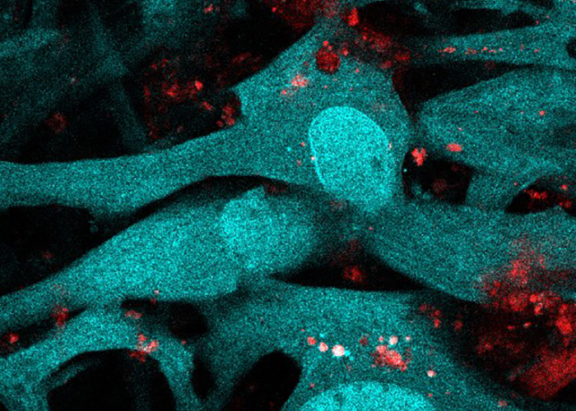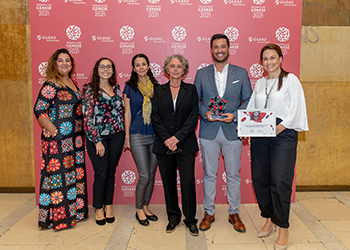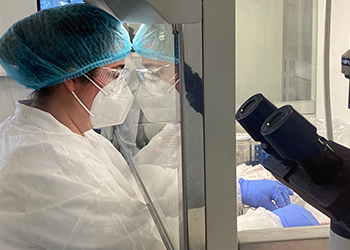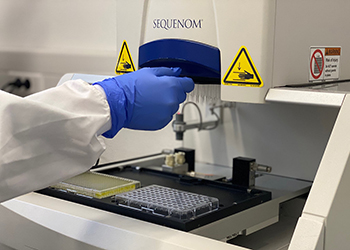
Disease Genetics
Carlos Penha Gonçalves
Disease and organ dysfunction are in many cases controlled by genetic factors. Disease Genetics research group is interested in uncovering how these factors work in specific cell types to drive organ inflammation trajectories and infectious disease outcomes. Under this theme they developed distinct projects working out:
- protective roles of trophoblast cells in placental malaria,
- the action of brain endothelial cells in propagating inflammation in cerebral malaria and
- Kupffer cells responses to liver damage.
To perform this research they have make use of multiple resources including human sample collections, mouse models of disease and optimized cell primary culture systems. This work is leading them to ask how cell-type specific phenotypic adaptation triggered by inflammatory and infectious environments impacts in organ and systemic responses to subsequent challenges.
Researchers expect this research will contribute to bridge the fields of infectious diseases and metabolic disorders elucidating the role of disease adaptation mechanisms in the protection of organic and systemic functions.
Projects
Brain microvessels endothelial cells (BMECs) compose the first layer of the blood brain barrier (BBB). BMECs are seen in cerebral malaria (CM) pathogenesis only as targets of pro-inflammatory mediators and circulatory/coagulation imbalances.
We proposed that BMECs also take part in CM development as sensors and initiators of effector immune reactions elicited by Plasmodium components or infected erythrocytes (IE).
In particular, we plan to investigate the crosstalk of BMECs with other cell types at the BBB during malaria infection using co-culture systems (3D, microfluidics platforms) and tissue-restricted gene deletion models.
This research will delineate a map of interactions within BBB components detailing sensors and pathways of innate signaling and patterns of activation in cells of the BBB induced by exposure to IE that likely will be relevant to other infectious encephalopathies.
Liver resident macrophages (Kupffer cells) play critical roles in the response to liver injury.
Researchers are investigating liver recovery after hepatotoxic damage, which induces profound depletion of Kupffer cells followed by macrophage repopulation.
The findings indicate that hepatotoxic liver damage imposes alterations in the ontogenic composition of the post-recovery liver macrophage populations with Kupffer-like phenotype (e.g. high representation of hematopoietic-derived macrophages).
Researchers want to uncover the role of macrophages in resolution of liver damage by asking whether in the aftermath of an initial hepatotoxic injury macrophage phenotypic adaptation improves hepatic tissue resilience to subsequent challenges.
They expect this research to highlight how phenotypic plasticity of non-parenchymal cell-types (particularly macrophages) protects tissues against prolonged or multiple insults.
Fetal-derived syncytialized trophoblasts are posed at placental barrier in direct contact with maternal blood.
Using experimental models we investigated the pathogenesis of placental infection by the malaria parasite and found two unanticipated turns:
Puzzled by these observations we plan to investigate the pathophysiological relevance of trophoblast responses to malaria in two angles:
Publications
- Teresa F. Pais, Hajrabibi Ali, Joana Moreira da Silva, Nádia Duarte. Rita Neres, Chintan Chhatbar, Rita C. Acúrcio, Rita C. Guedes, Maria Carolina Strano Moraes, Bruno Costa-Silva, Ulrich Kalinke and Carlos Penha-Gonçalves (2022) Brain endothelial STING1 activation by Plasmodium-sequestered heme promotes cerebral malaria via type I IFN response. Proceedings of the National Academy of Sciences 119 (36)
- Faro-Viana, J., Bergman, ML., Gonçalves, L.A., Duarte N., Coutinho T.P., Borges P.C., Diwo C., Castro R., Matoso P., Malheiro V., Brennand A., Kosack L., Akpogheneta O., Figueira J.M., Cardoso C., Casaca A.M., Alves P.M., Nunes T., Penha-Gonçalves C. & Demengeot J. (2022) Population homogeneity for the antibody response to COVID-19 BNT162b2/Comirnaty vaccine is only reached after the second dose across all adult age ranges. Nature Communications 13:140
- Gonçalves, L.A., Rodo, J., Rodrigues-Duarte, L., de Moraes, L.V., Penha-Gonçalves, C. (2017) HGF secreted by activated Kupffer cells induces apoptosis of Plasmodium-infected hepatocytes.. Front Immunol. 8:90
- de Moraes, L.V., Dechavanne, S., Sousa, P.M., Barateiro, A., Cunha, S.F., Nunes-Silva, S., Lima, F.A., Murillo, O., Marinho, C.R., Gangnard, S., Srivastava, A., Braks, J.A., Janse, C.J., Gamain, B., Franke-Fayard, B., Penha-Gonçalves, C. (2016) Murine Model for Preclinical Studies of Var2CSA-Mediated Pathology Associated with Malaria in Pregnancy.. Infect Immun. 84(6):1761-74
- Duarte N, Coelho IC, Patarrão RS, Almeida JI, Penha-Gonçalves, C., Macedo MP. (2015) How inflammation impinges on NAFLD: A role for Kupffer cells.. Biomed Res Int. 2015:984578
- Trovoada, Mde J., Martins, M., Ben Mansour, R., Sambo, M.R., Fernandes, A.B., Gonçalves, L.A., Borja, A., Moya, R., Almeida, P., Costa, J., Marques, I., Macedo, M.P., Coutinho, A., Narum, D.L., Penha-Gonçalves, C. (2013) NOS2 variants reveal a dual genetic control of nitric oxide levels, susceptibility to Plasmodium infection, and cerebral malaria.. Infect Immun. 82(3):1287-95
- Ball, E.A., Sambo, M.R., Martins, M., Trovoada, M.J., Benchimol, C., Costa, J., Gonçalves, L.A., Coutinho, A., Penha-Gonçalves, C. (2013) IFNAR1 controls progression to cerebral malaria in children and CD8+ T cell brain pathology in Plasmodium berghei-infected mice.. J Immunol. 190(10):5118-27
- de Moraes, L.V., Tadokoro, C.E., Gómez-Conde, I., Olivieri,, D.N., Penha-Gonçalves, C. (2013) Intravital placenta imaging reveals microcirculatory dynamics impact on sequestration and phagocytosis of Plasmodium-infected erythrocytes.. PLoS Pathog. 9(1):e1003154
- de Moraes, L.V., Penha-Gonçalves, C. (2013) Placental malaria: from infection to malfunction.. Cell Host Microbe. 13(2):125-7
- Gonçalves, L.A., Rodrigues-Duarte, L., Rodo, J., de Moraes, L.V., Marques, I., Penha-Gonçalves, C. (2013) TREM2 governs Kupffer cell activation and explains belr1 genetic resistance to malaria liver stage infection.. Proc Natl Acad Sci USA. 110(48):19531-6
- Rodrigues-Duarte, L., de Moraes, L.V., Barboza, R., Marinho, C.R., Franke-Fayard, B., Janse, C.J., Penha-Gonçalves, C. (2012) Distinct placental malaria pathology caused by different Plasmodium berghei lines that fail to induce cerebral malaria in the C57BL/6 mouse.. Malar J. 11:231
- Côrte-Real, J., Duarte, N., Tavares, L., Penha-Gonçalves, C. (2012) Innate stimulation of B1a cells enhances the autoreactive IgM repertoire in the NOD mouse: implications for type 1 diabetes.. Diabetologia 55(6):1761-72



